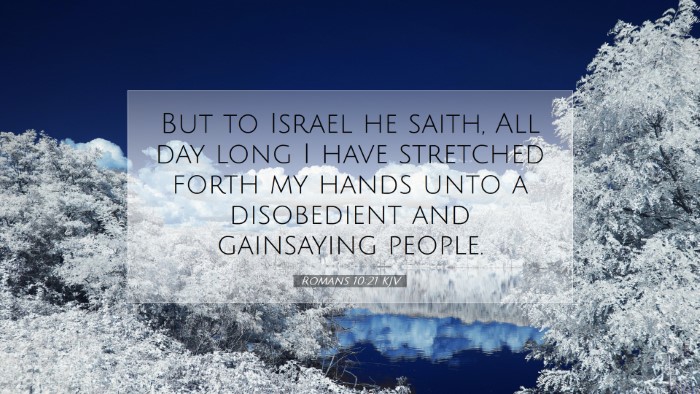Old Testament
Genesis Exodus Leviticus Numbers Deuteronomy Joshua Judges Ruth 1 Samuel 2 Samuel 1 Kings 2 Kings 1 Chronicles 2 Chronicles Ezra Nehemiah Esther Job Psalms Proverbs Ecclesiastes Song of Solomon Isaiah Jeremiah Lamentations Ezekiel Daniel Hosea Joel Amos Obadiah Jonah Micah Nahum Habakkuk Zephaniah Haggai Zechariah MalachiRomans 10:21
Romans 10:21 KJV
But to Israel he saith, All day long I have stretched forth my hands unto a disobedient and gainsaying people.
Romans 10:21 Bible Commentary
Commentary on Romans 10:21
Verse: "But to Israel he saith, All day long I have stretched forth my hands unto a disobedient and gainsaying people." (Romans 10:21)
Introduction
In this poignant verse from Romans, the Apostle Paul underscores the persistent rejection of God by Israel, despite His open invitation to reconciliation. Paul references God’s long-standing appeal to His people, highlighting their obstinacy. This passage serves as a profound call for reflection on the nature of divine patience and human disobedience.
The Divine Appeal
Matthew Henry: In his commentary, Henry emphasizes the infinite grace of God, depicted in His ‘stretched forth hands,’ signifying His desire for the salvation of Israel. This imagery suggests a heart truly seeking its people, demonstrating that God's outreach is ceaseless, even amidst persistent rejection. Henry notes that God has made every effort to bring His people to repentance and faith, yet they remained ‘disobedient and gainsaying.’
Albert Barnes: Barnes elaborates on the metaphor of God's hands being stretched forth. He posits that this is indicative of an open invitation to salvation, showing that God is ever ready to receive those who would come to Him. The notion of ‘all day long’ reflects not only the duration of God’s invitation but the urgency of His longing for His people’s return. Barnes also mentions that the 'gainsaying' refers to their persistent objections and unwillingness to heed God’s call.
Adam Clarke: Clarke provides a theological perspective on God’s desire for reconciliation. He states that the ‘stretched forth hands’ symbolizes God's readiness to offer mercy and grace to the wayward, portraying God as patient and enduring. Clarke suggests that the refusal of Israel to acknowledge this divine mercy exemplifies a tragic history of covenantal rejection and an unwillingness to embrace the truth presented to them.
Understanding Disobedience
Matthew Henry: Henry points out that disobedience is a profound sin against the backdrop of divine grace. He notes that Israel had every opportunity to respond positively yet chose to remain in their wayward paths. This can be seen as a striking reflection of human nature—preferring the comfort of tradition over the challenge of faith and obedience.
Albert Barnes: Barnes addresses the concept of ‘gainsaying’ as a refusal to accept God's truth. He explains that this involves not only disbelief but also a contentious spirit against divine instruction. It represents an active resistance to the gospel message, which can serve as a cautionary note for any group or individual inclined to dismiss divine revelations.
Adam Clarke: Clarke explores the deeper implications of Israel’s spiritual blindness. He argues that disobedience leads to a gradual hardening of the heart, which makes one less receptive to God’s truth over time. It presents a theological warning about the dangers of persistent sin and the importance of heeding the call to repentance and change.
The Theological Implications
Matthew Henry: Henry acknowledges the broader implications of this passage concerning God’s unconditional love and justice. It opens a discourse on the relationships between divine sovereignty and human free will, illustrating that while God's offer of grace is available, the acceptance of such grace ultimately lies within the individual's choice.
Albert Barnes: Barnes stresses the importance of this verse in understanding the nature of God’s patience. He notes that while God is loving and unending in His pursuit of humanity, the consequences of disobedience are real and consequential. This tension between divine grace and human responsibility must not be overlooked in theological discourse.
Adam Clarke: Clarke reasons that this verse embodies the essence of God’s communication with humanity throughout history. It signals prophetic warnings about the consequences of a hardened heart and emphasizes the idea that rejection of God leads to spiritual and eternal loss. The theological richness of this verse presents profound insights into God's character and humanity’s response.
Application for Today's Believers
For pastors, students, theologians, and scholars, Romans 10:21 serves as a critical reminder of the call to humility and responsiveness to God’s voice. The persistent invitation presented in the verse encourages believers to examine their lives for any areas of disobedience or spiritual apathy.
- Reflect on God’s Patience: Consider the ways in which God has continually reached out to you. How have you responded to His call?
- Examine Disobedience: Reflect on areas of life where you may be resisting God’s will. Are you aware of any ‘gainsaying’ in your own heart?
- Embrace Grace: Acknowledge God's grace and mercy. Are you living in the fullness of His offered salvation?
- Promote Awareness: As leaders, encourage others in your community to recognize the depth of God’s invitation and their response to it.
Conclusion
Romans 10:21 encapsulates a profound truth about the nature of God’s outreach versus human disobedience. Through the insights gathered from esteemed commentaries, we gain a richer understanding of divine grace, the tragedy of rejection, and the urgency of responding to God’s call. As we engage with this text, we are encouraged not only to reflect on our own faith journeys but also to extend God’s invitation to others who may be living in disobedience.


